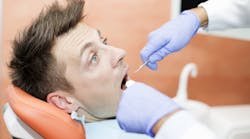In her oral cancer course, Susan Cotten, RDH, BSDH, OMT, shares the story of Sean Marsee, a former high school athlete in Ada, Oklahoma, who died of oral cancer caused by chewing tobacco. At the time, he was popular amongst peers and a fierce competitor, winning 28 medals at high school track meets during his career. Needless to say, he was in near-perfect physical shape.
As an athelete, Sean had always taken excellent care of his body by monitoring his diet, lifting weights, and running five miles a day six months out of the year. He didn't smoke or drink, but Sean was a frequent user of so-called "safe" forms of tobacco, such as chewing tobacco and snuff. Starting at age 12, Sean began to "dip" habitually and eventually passed away.
It's safe to say that no form of tobacco consumption is, well, safe.
Why many athletes use tobacco
Perhaps most notably associated with baseball, smokeless (and chewing) tobacco has entrenched itself in the world of professional sports over the years. With its alleged reputation of "enhancing" players' performances during games, this substance has appeared in the NBA, NHL, NFL, and MLB even after systematic crackdowns attempting to discourage widespread use.1 However, despite the anti-tobacco legislation-and its link to poor oral health-it continues to be used in the sports world and beyond.
In 2014, Padres Hall-of-Famer Tony Gwynn, who was known to use smokeless tobacco, passed away from salivary gland cancer.1 Are your athletic patients damaging their mouths in a similar way?
"Dip" (wads placed inside of the cheek) and "snuff" (finely ground or shredded particles sniffed through the nose) are colloquial terms that refer to chewing tobacco and smokeless tobacco.2 Some athletes use these products to improve concentration during a game, relaxation, weight control, performance enhancement, or for ritualistic reasons.2 Athletes addicted to nicotine also reported using chewing tobacco to maintain their nicotine levels in order to "feel normal" during a sport performance.3
And according Dr. Anikar Chhabra of the Mayo Clinic, some people turn to smokeless and chewing tobacco due to the exposure and normalization amongst team members and sports culture as a whole.
"It's a thing people do to pass the time, and once they start they can't stop," Chhabra says. "Cigarettes are visible and affect those around them. The stigma (around smokeless) is much less pronounced … and thus the effects have never been publicized. People don't talk about it as much like they do with cigarettes."1
Dangerous effects of tobacco
Even if players believe it offers temporary performance benefits, smokeless and chewing tobacco can have detrimental effects—on both the oral and overall health of the user. Not only that, but there is not conclusive evidence to support or uphold the claim that nicotine improves athletic performance or recovery. Even still, it remains popular amongst athletes particularly because snuff and dip provide a direct hit of nicotine without disrupting their respiratory systems.2 For starters, tobacco is dangerous for the cardiovascular system during or after exercise. Even in smokeless form (or in the form of dip) tobacco is an addictive substance that may serve as a gateway to traditional cigarette smoking.2 Consistent use also increases the risk of developing pancreatic, oral or oropharyngeal cancer.2,4 It may cause heart disease and stroke as well.4
But what about the mouth and gums?
Oral health concerns and prevention
Snuff and dip are particularly dangerous because the tobacco is placed directly against the inside of the mouth and nose. In fact, an average-sized wad of dip held in the mouth for 30 minutes releases three cigarette's worth of nicotine into the body.4
In addition to increasing one's risk for various cancers, smokeless and chewing tobacco have deleterious oral health effects. For example, dip can easily wear down the teeth, which can lead to cavities and decay in exposed tooth roots. It can also darken the gums and cause separation from the teeth, making them loose - and tooth loss is not something a patient can magically reverse.4
Smokeless tobacco also causes xerostomia, halitosis, and stained teeth.
If you're examining a patient who uses snuff or dip, it's important to check for signs of oral cancer. These include:
• Mouth sores that bleed easily/don't heal
• A lump in the mouth or on the neck
• Soreness, swelling, or white patches that don't go away
• A patient having trouble chewing, swallowing, or moving their tongue or jaw
While athletes may turn to smokeless tobacco for perceived performance benefits, the long-term oral health risks far outweigh any short-lived advantages, However, even if patients have damaged their oral health by using smokeless tobacco, there's still hope for improvement; being tobacco free for five years cuts the risk of oral cancer in half.4 That being said, it's still crucial to prioritize patient education and tobacco cessation.
References:
- Sharp R. Tobacco use still prevalent among professional athletes. Global Sport Matters. February 2019. https://live-global-sport-matter.ws.asu.edu/health/2019/02/27/tobacco-use-still-prevalent-among-professional-athletes/
-
Chagué F, Guenancia C, Gudjoncik A, Moreau D, Cottin Y, Zeller M. Smokeless tobacco, sport and the heart. Arch Cardiovasc Dis. 2015 Jan;108(1):75-83. https://doi.org/10.1016/j.acvd.2014.10.003
-
Effects of snus administration on sport performance. World Anti-Doping Agency. 2013. https://www.wada-ama.org/en/resources/scientific-research/effects-snus-administration-sport-performance
-
The health effects of smokeless tobacco. Smokefree Veterans. https://veterans.smokefree.gov/quit-dip-vapes/smokeless-tobacco/health-effects-smokeless-tobacco/








